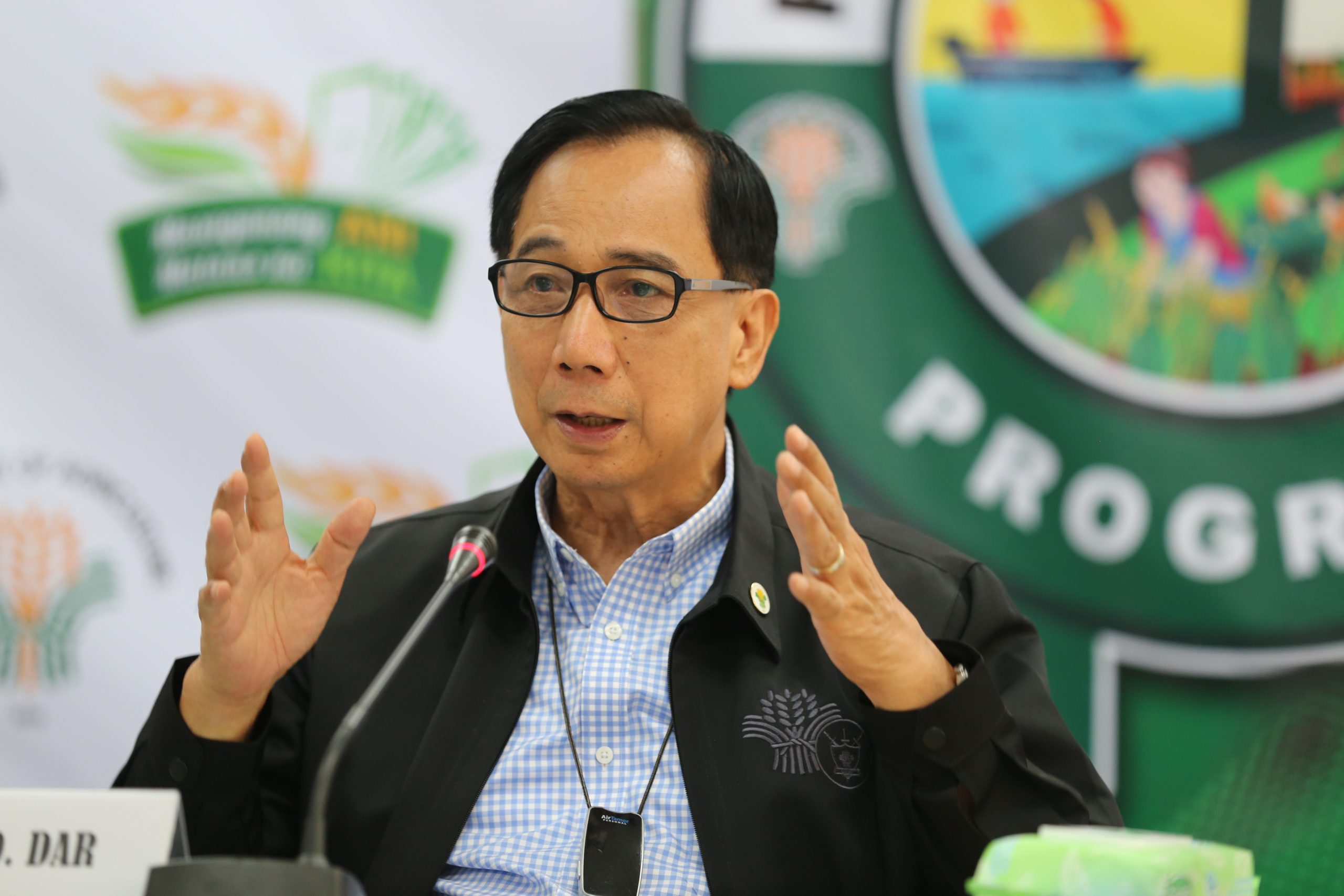
The Department of Agriculture (DA) will implement key strategies to “grow” and fuel the transformation of the Philippine agriculture and fishery sector into a modernized and industrialized economic powerhouse.
“We shall depart from our usual approach of just targeting individual farms or groups without producing significant outcomes from interventions. We must be purpose-driven, ensuring that our programs and projects are of value, not only to recipients but more significantly to the whole society in real terms,” said Agriculture Secretary William Dar in his recent memorandum to all top DA officials and key technical staff.
At the core of this strategy is farm clustering and consolidation, dubbed as “Bayanihan Agri Cluster” or BAC that aims to converge and integrate government interventions such as provision of loans, farm mechanization, free seeds and fertilizers, and market support.
Secretary Dar said farm clustering will “empower farmers to gain more benefits from the agriculture value chain and make interventions more effective and efficient.”
The DA will also vigorously implement systematic, inclusive approaches at the farm level next year and until the term of the Duterte administration.
“We must empower our farmers and fishers through collective action so they will have the opportunity to partner with the different actors in the industry. Leaving them alone will not accelerate the development of the sector,” he said.
The DA will also implement social protection and safety-net measures to benefit resource-poor farmers — as embodied in the department’s flagship Plant Plant Plant program — in the form of cash assistance, subsidized credit and crop insurance.
Further, the Department will also accelerate the completion of the national farmers’ and fishers’ registry in order to improve the delivery of support services and other forms of interventions to eligible and deserving small farmers and fishers.
The establishment of “agri-industrial business corridors” or ABCs will also be actively pursued in 2021. These hubs will serve as processing and marketing centers of agriculture and fishery products in identified production areas. All set to groundbreak is the ABC at New Clark Green City.
“The ABCs will house agri-business and multi-purpose facilities that will be key to managing and integrating the food supply chain, as well as introducing innovative agricultural technology to farmers,” Secretary Dar said.
One of the first projects to be established at the Clark ABC is the National Seed Technology Park (NSTP), which aims to develop high-yield seed varieties to help farmers improve the level and quality of their harvests.
The NSTP will serve as a one-stop hub for the seed value chain, including research and development facilities, a model seed farm and processing facility, infrastructures for skills training, experimental and commercial plots, demonstration plots, and an exhibition and farmers’ convention center.
The DA will also intensify infrastructure investments in major agri-fishery production areas, which include construction of farm-to-market roads, trading posts, fish ports and processing plants.
“Agro-industrialization entails leveraging public investments with local and foreign private investors through incentives and regulations to develop the sector’s value chain,” said Secretary Dar, emphasizing the importance of strong partnership with local government units (LGUs).
For this reason, he said the DA will actively pursue the implementation of the Province-led Agriculture and Fisheries Extension System (PAFES). This will be guided by the provincial commodity investment plan (PCIP), a three-year rolling plan developed by the DA-Philippine Rural Development Project (DA-PRDP), that seeks to rationalize government interventions in the commodity value chains.
The PCIP also serves as the basis for identifying needed infrastructure and enterprise development sub-projects that can be funded by DA-PRDP, with counterparts from LGUs. The project was jumpstarted by Ilocos Norte in September this year. Other pilot provinces will follow suit in 2021.
The DA will also work on upscaling the implementation of “Agriculture 4.0,” or the so-called fourth agricultural revolution, which seeks the use of smart farming technologies.
Secretary Dar said the DA is working on the use of satellite technology to expand coverage of crop insurance and estimation of crop damages and losses due to typhoons and other natural disturbances. One offshoot of the Covid-19 pandemic is the acceleration of the digitalization of the country’s agriculture and fishery sector.
The e-Kadiwa — the digital platform of the DA’s “Kadiwa ni Ani at Kita” marketing program — highlighted the cost-reducing power of digital technology that directly links farmers with consumers, as well as with small and medium enterprises involved in food processing.
The DA will upscale e-Kadiwa, not only by linking farmers to buyers and consumers, but also by looking into logistics like renting Kadiwa trucks and refrigerated vans to transport perishable agricultural items from the farms to urban markets.
The year 2020 also drew attention to the vulnerability of the agriculture sector to climate change and extreme weather disasters. The effects of climate change, along with the destruction caused by natural disasters like typhoons, earthquakes, and flooding, make it more difficult to ensure food security to an ever-growing population of the country.
To be mainstreamed in DA’s plans, programs, and activities is the implementation of climate change mitigation and adaptation measures, including scaling out gains from AMIA using science-based decision support tools for vulnerability assessment, investment targeting, farm-fishing operations, and better planning for infrastructure, finance and insurance, research and development, regulations, and extension support.
The DA chief thus urged all officials and staff to promote and embed these strategies in field operations.
“Let us operationalize these core strategies as we implement our various interventions. Beyond the productivity targets, we want to pursue outcomes that will help firm-up the attainment of our goal of ‘masaganang ani at mataas na kita.’ We have survived and rebooted in 2020, let us now grow in 2021,” he concluded. ### (DA StratComms)













